Best Gas Pressure Washers 2021 – Reviews & Top Picks
Last Updated on December 17, 2021 by Mark Johnson
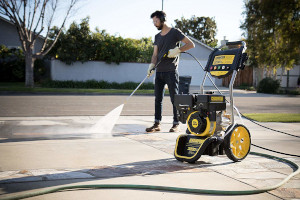
If you need the absolute best, top-of-the-line pressure washer, then you need to get a gas-powered model. Unfortunately, shopping online for these tools isn’t always a top-of-the-line experience.
If you’re looking for a better experience, one that gives you all the information you need to make a well-informed decision, then you’ve come to the right place. The following reviews are designed to give you everything you need to know about the best gas pressure washers of 2020.
The buyer’s guide is a good place to start if you’ve never owned a gas pressure washer before. With this guide, you can learn everything you need to know about these products before you buy.
Our Top 5 Choices of 2021
| Model | Price | Weight | Editor Rating |
|---|---|---|---|
DEWALT DXPW4240 4200 PSI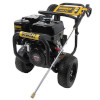 (Top Pick) | Check Price | 141 lbs | 4.3/5 |
SIMPSON Cleaning ALH4240 4200 PSI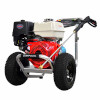 | Check Price | 124 lbs | 3.9/5 |
WEN PW31 3100 PSI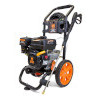 (Best for the Money) | Check Price | 67 lbs | 4.2/5 |
Champion 3200-PSI 2.4-GPM 100384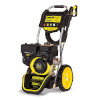 | Check Price | 68 lbs | 4.3/5 |
PowerBoss 20649 3100 PSI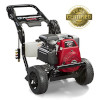 | Check Price | 62 lbs | 3.8/5 |
5 Best Gas-Powered Power Washers – Our Reviews
1. DEWALT DXPW4240 4200 PSI – Top Pick
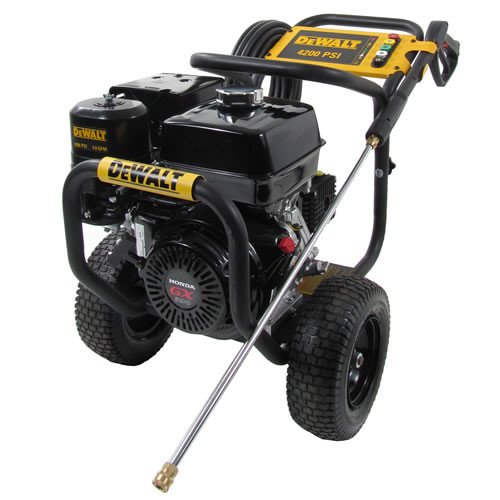
The DEWALT DXPW4240 4200 PSI is the best gas-powered power washer on the market and a great choice for anyone who has a serious job to do. It comes with 4200 PSI of washing pressure, which is about the most you’ll find available among pressure washers. It also includes five quick-connect nozzles, which means you can get the most cleaning power (or the widest spread) with the same machine. All you have to do is change out the nozzle to the one best suited to the task. This model is mounted on a cart that comes with 13-inch tires, which are tall enough to roll over any obstacle with ease.
The best thing about this pressure washer is its great Honda engine. It almost always starts on the first pull, which means you can get to work faster than you could with other models. The only real issue with this model is that a small percentage of them are duds. If you try it out promptly after getting it, you’ll have time to return it or get it repaired under warranty. But given how good it works when it works, no one should have to deal with that problem.
- 4200 PSI
- Five quick-connect nozzles
- 13-inch tires
- Starts on first pull
- Some quality control problems
2. SIMPSON Cleaning ALH4240 4200 PSI – The Runner-Up
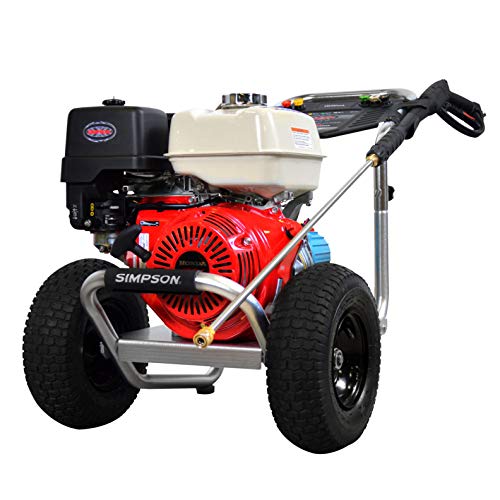
The SIMPSON Cleaning ALH4240 4200 PSI is very similar to the previous model, potentially making it a good choice for you if you like the Dewalt but don’t want to deal with possible quality control issues. It also comes with a great Honda engine that almost always starts on the first pull. And engines that start that quickly tend to be well-made and last a long time. It’s also capable of producing 4200 PSI, giving you the pressure you’ll need to clean the toughest surfaces and to do it quickly as well. The included 50-foot hose means that you’ll be able to cover more area without having to reposition the cart, which will also save you some time in the long run.
This model includes five quick-connect nozzles, which means you’ll be able to change them out to the kind you need for the task at hand. If this model sounds very similar to our first-place model, that’s because it is. What keeps this model out of first is the fact that it costs about 20 percent more than our top model, without providing any added value. While this is a good buy, you can get the same power for less money.
- 4200 PSI
- Starts on first pull
- 50-foot hose
- Five quick-connect nozzles
- Price
3. WEN PW31 3100 PSI – Best for the Money
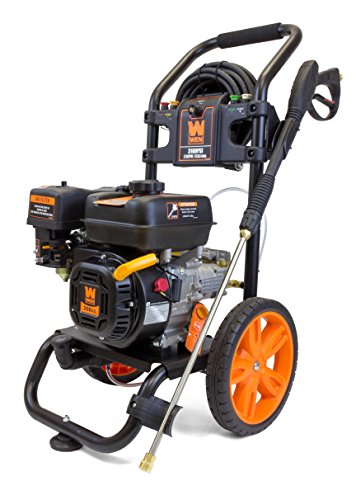
The WEN PW31 3100 PSI is our choice for “best for the money.” Like the two models before it, it comes with five nozzles, which gives you the ability to do just about any cleaning project that you would need to do. It also comes with a 30-foot hose. Though it isn’t the longest one on our list, it’s long enough that you’ll have a decent range when working so that you won’t need to buy an aftermarket hose. It also produces 3100 PSI, which is going to be more than enough power for most domestic—and many commercial—cleaning projects.
But what really sets this model apart is that you can buy it for less than half the price of the first two models on our list. If you want to get excellent cleaning power without paying through the nose to get it, be sure to check this model out. The only real issue is that some of the models don’t work on startup. Regardless of whether it’s a design or a shipping problem, it’s enough to knock this model down to third. However, this model still provides the best value for the money.
- Five nozzles
- 30-foot hose
- Great price
- 3100 PSI
- Some quality control problems
4. Champion 3200-PSI 2.4-GPM 100384
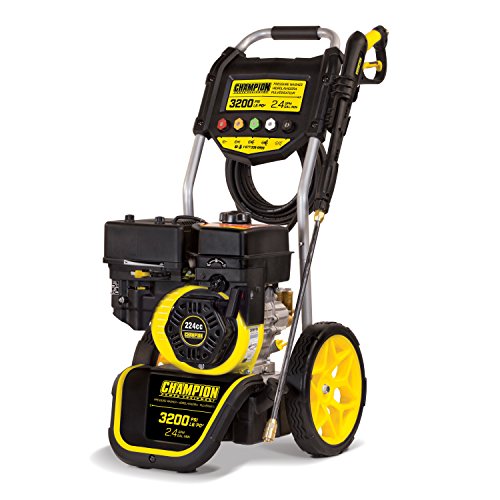
The Champion 3200-PSI 2.4 GPM 100384 may be the right model for you if you’re looking for a pressure washer that can spray detergent like there’s no tomorrow. Some problems require the use of a lot of detergents, and the small detergent tanks on most models leave you frequently having to stop and reset. This model comes with two half-gallon tanks. So you can spray detergent for long stretches without having to pause to refill those tanks. Needless to say, this will save you a lot of time if you frequently use detergent.
However, the Champion isn’t a perfect model. It comes with a hose that’s only 25 feet long. That’s half the length of the longest hose on our list—short enough that it feels like you’re not getting very great value for the price. It also comes with significant shipping problems that often lead to the units breaking during transport, so that they won’t start up the first time you try them. This doesn’t affect all units, but it’s significant enough that we need to mention it. If these problems could be resolved, we’d rank this model higher. As it is, it falls to fourth on our list.
- Five nozzles
- Two detergent tanks
- 25-foot hose
- Shipping problems
5. PowerBoss 20649 3100 PSI
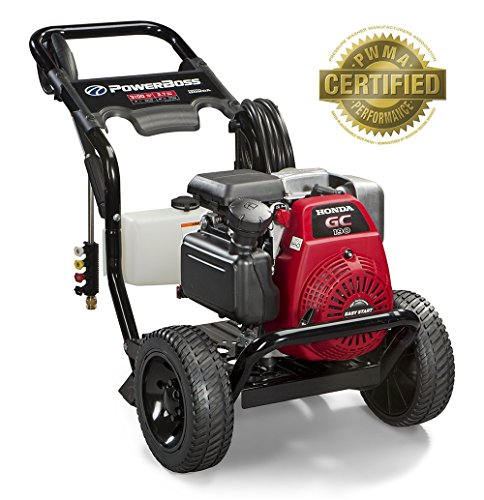
The PowerBoss 20649 3100 PSI is a decent buy, but it doesn’t provide as much value as the other entries mentioned here, which means it earns last place on this list. It comes with four nozzles, which is enough to do most tasks. But you’ll get more with the other models we reviewed. The engine is made by Honda, and it tends to start on the first pull, so you won’t waste time trying to get this model going. It also comes with a one-gallon detergent tank—one of the largest single tanks you’ll find on any pressure washer.
Unfortunately, it only comes with a 25-foot hose. You can make do with a hose of that length, but many people will want something longer. Upgrading will be tricky with this model though. It uses proprietary connectors to attach the hose to the pump, so not every brand will be compatible. It’s also a bit on the expensive side relative to the value it provides, which certainly doesn’t help it any when it goes toe-to-toe with other models.
- Four nozzles
- One-gallon detergent tank
- Easy to start
- 25-foot hose
- Price
Buyer’s Guide
We hope that our reviews already have you thinking about which models are right for you. If you skipped past those reviews because you want to learn about gas pressure washers in general, then you’ve come to the right place. This buyer’s guide is designed to walk you through everything you need to know about these tools so that you can make a good decision when it’s time to buy. It’s also a useful resource to consult if you’re returning to the market after an old, trusted pressure washer gave up the ghost. Here, you’ll learn about recent developments that make for even better value.
Pressure
The good news about gas pressure washers (when it comes to pressure) is that most models are going to be able to do most kinds of tasks without any kind of trouble whatsoever. With electric models, especially portable ones, you may find yourself in a situation where you don’t have enough power to get the job done. Or you might find that it takes a long time to get to that point.
With gas-powered models, the lowest pressure that you should expect to see is 3100 PSI. This is more than enough to tackle just about any job you’d want a pressure washer for. These pressure washers top out at about 4200 PSI, which mean that you can get everything done, but with the added benefit of getting it done much faster.
Consequently, you don’t have to worry too much about pressure, unless you’re going to be using your pressure washer all of the time. If that’s the case, it would be wise to go with a model with higher pressure. This will let you work faster and will save you a lot of time in the long run.
Included Nozzles
Since you’re not going to notice a massive difference between models on this list in terms of pressure, the included nozzles become that much more important. While many models come with the same number and type of nozzles, it’s important to understand what each type does so that you can make sure you get the nozzles that you’ll get the most benefit from.
Zero-degree nozzle
While you won’t often find this nozzle type included with electric pressure washers, it’s common with gas pressure washers. It’s one of the most powerful nozzles—to the point that you may not want to use it to clean your car because, along with the dirt, it might take the paint right off. This is the best nozzle to use with the toughest cleaning jobs, especially if you’re trying to strip paint off a surface.
These nozzles are called “zero-degree” because the stream is as focused as it can be. In other words, you get the highest possible pressure out of the nozzle concentrated on a very small point, giving you incredible cleaning power. Be careful with this nozzle. It might be powerful enough to splinter wood or siding, so it may not be the best choice to use on your fence or home.
15-degree nozzle
All nozzle types use the same amount of water. The difference is in how much the nozzle spreads out the water. Wider nozzles can cover larger areas at once, meaning you won’t have to make as many passes, but there’s less cleaning power. The 15-degree nozzle spreads the water out over a 15-degree arc.
It still has plenty of power, so it’s a good choice if you’re looking to strip paint or varnish off a fence or deck. Though it’s unlikely to damage the underlying wood, it’s still powerful enough to remove surface coatings easily. It’s also a good choice for cleaning really dirty sidewalks or driveways, since it still has plenty of punch, but with a wider arc than a zero-degree nozzle.
25-degree nozzle
If you’re looking to remove loose dirt, mildew, or even leaves from a large area (such as a sidewalk or driveway), you should reach for the 25-degree nozzle. It comes with plenty of power, but it’s far more spread out, making it a gentler alternative to the previous two nozzles.
It’s good for cleaning fences or decks—you won’t have to worry about stripping off the varnish or paint. And its wider arc means that it will get large jobs done faster if you’re able to get a good clean on the first pass.
40-degree nozzle
The 40-degree nozzle is the best one for cleaning vehicles, as it spreads the water out enough to prevent damaging the underlying paint. It’s also a good choice for cleaning large areas. Sporting the widest commonly available arc, it’s the fastest-cleaning nozzle if you can remove all dirt and grime in a single pass.
Detergent
Detergent might not be on the forefront of your mind when you go to buy a gas pressure washer. When washing, however, you may find that you need to apply some first to ensure easy dirt and grime removal. Many pressure washers come with a special detergent nozzle, which is designed to coat surfaces in soap, allowing them to clean more easily when you make a second pass with a different nozzle.
Many gas pressure washers use an in-line detergent system, which means that they will add detergent to the mix if detergent is added to the onboard tanks. If you buy a model with larger tanks, you can go for longer without having to stop and refill. Naturally, some models will serve you far better in this area than others.
Hose
You might think that you can just change out the hose that comes with a pressure washer anytime you want. But that’s not always the case. Some companies use a proprietary fitting to connect the hose to the pump, which can mean that there won’t be any aftermarket options available if you want to upgrade your hose. Consequently, it’s important that you figure out what kinds of fittings it uses before you buy—especially if you think the included hose is on the short side and you’d like to upgrade to a longer one.
You also want to pay attention to the fittings on the other side of the hose. Some companies include a hose and nozzles with proprietary fittings, which means they only connect to each other. If you change out the nozzles in that situation, you’d have to get a new hose as well, and vice-versa.
Mobility
Gas pressure washers aren’t the most mobile pressure washers on the market. But that doesn’t mean that you won’t feel the difference in weight between the lightest and heaviest models on our list. The lightest clocks in at about 150 pounds, which is heavy, but since they’re wheeled, most people won’t have a problem transporting them from place to place… though getting them into a truck bed might require a team effort.
The heaviest weigh several hundred pounds, which means you probably won’t want to move them around a lot by yourself. Having a long hose makes this less necessary. And if your gas pressure washer is going to sit mostly in one place, then the weight won’t matter all that much, except during original delivery and setup.
Most models come with oversized wheels which make it easier to go over and around obstacles. And you should keep in mind that bigger wheels often make this process even easier. In other words, the washers with the largest wheels will be the most maneuverable.
Conclusion
The DEWALT DXPW4240 4200 PSI is our favorite model; it comes with five nozzles and 13-inch tires, and it usually starts on the first pull. The SIMPSON Cleaning ALH4240 4200 PSI is very similar to our top model, but it’s more expensive, knocking it down to second place. The WEN PW31 3100 PSI comes with five nozzles and a 30-foot hose. Its very low price makes it the best overall value for the money. The Champion 3200-PSI 2.4 GPM 100384 comes with five nozzles and two detergent tanks, but its 25-foot hose and shipping problems anchor it to fourth place. The PowerBoss 20649 3100 PSI isn’t a bad model, but its short hose and relatively high price mean it can’t beat out the other models on this list.
We hope that we’ve made the buying process a bit more straightforward with this list of reviews. Armed with this knowledge, you should be able to find a model you’ll love using at a price you’ll love, too.
